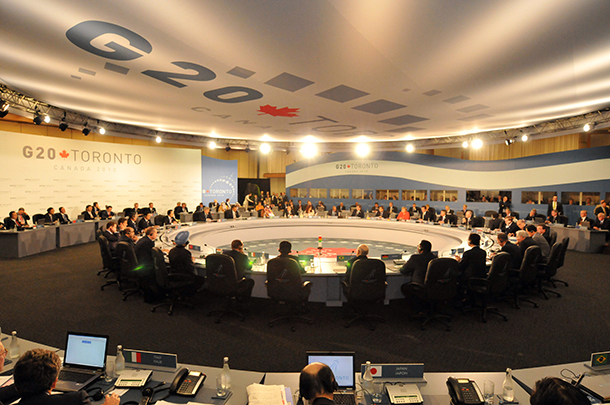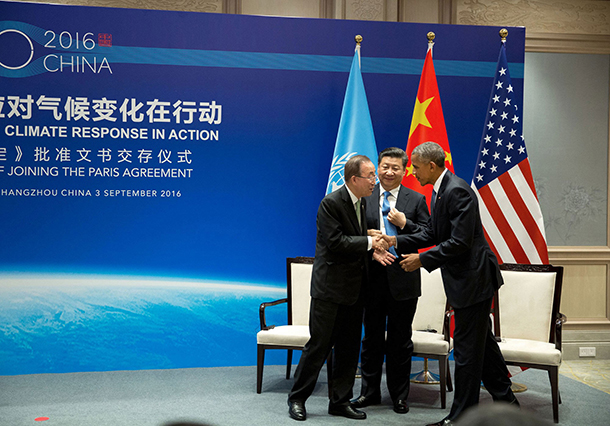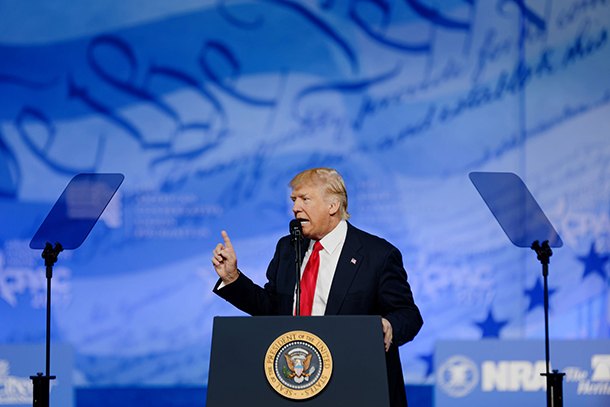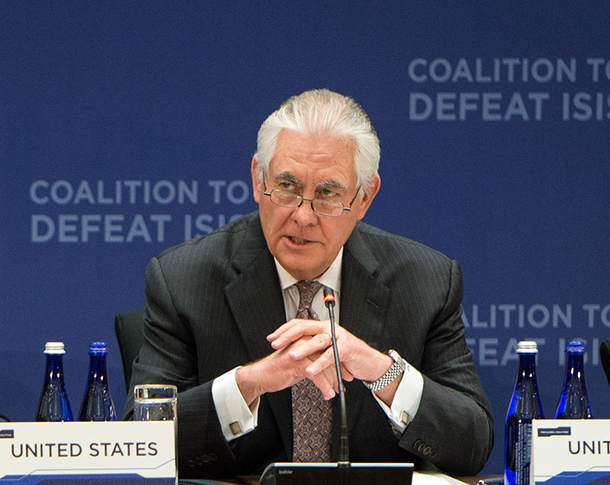U.S. Nixes G20 Climate Finance Declaration
Air Date: Week of March 24, 2017

The G20 is a forum for the heads of state of the world’s major economies to meet to discuss how their countries’ policies impact the global economy. Above, world leaders met in Toronto, Canada for the 2010 summit. (Photo: Number 10, Flickr CC BY-NC-ND 2.0)
Leaders of 85% of the world’s economies called for elimination of fossil fuel subsidies in 2009 to help address climate change. But now ina move that could hurt US businesses, the Trump administration and Saudi Arabia have axed climate finance language from the March 2017 G20 session. Harvard economist Joe Aldy discusses with host Steve Curwood the implications and also argues the U.S. should remain in the Paris Climate Agreement.
Transcript
CURWOOD: From PRI, and the Jennifer and Ted Stanley Studios at the University of Massachusetts, Boston, this is Living on Earth. I’m Steve Curwood.
With the new Trump administration, it can be hard to discern facts from fiction and promises from performance. So when candidate Trump pledged to pull the U.S. out of the Paris climate agreement it was unclear whether, when, and how he would break America’s promise to the world to take effective climate action. Mr. Trump’s budget proposals to slash climate research and regulatory actions have been important signs, but those have yet to be enacted.
Well, now the U.S. is taking official action to back away from a key element of the Paris deal — money to help the most climate-endangered countries manage those impacts. Acting with Saudi Arabia the U.S. has pulled climate finance off the agenda of an upcoming meeting of the G20. To explain more, we’re joined now by Harvard economist Joe Aldy, who served in the Obama White House.
Joe, welcome back to Living on Earth.
ALDY: Thanks, Steve. It's a pleasure to be here.
CURWOOD: Just for the record, who is in the G20 and, in particular, why does it matter for climate discussions?
ALDY: Well, the G20 represents the largest developed and developing countries. It's every country you can think of that plays a major role in economic production and trade. So you have the U.S, and China, many countries from Europe, India, Mexico, Brazil, South Africa, and since the financial crisis and the Great Recession, we've had the heads of state, the leaders of these countries get together at least once a year to discuss the important economic and financial issues and policies around those issues that are really important for the world, and I think what's significant about this is the recognition since 2009 that there's an important role for economic and financial policy when it comes to climate change.
CURWOOD: How has a G20 addressed climate change in the past?
ALDY: Well, I think the most substantial effort taken by the G20 was in 2009. The United States hosted the G20 summit in Pittsburgh that fall, and you had the leaders of the largest developed and developing country say we should eliminate our subsidies on fossil fuels, and I think that has an important impact both in lowering our emissions in the near term, but also creating stronger incentives for firms to invest in renewables or energy efficiency in these markets where they don't have to compete with subsidized fossil fuels. I think that's actually a really big effort and an important effort we've seen in the G20, but I think they've expanded in recent years in addressing more and more the climate change agenda and demonstrating the resolve of heads of state in taking on this issue.

Former President Barack Obama, President Xi Jinping of China and United Nations Secretary General Ban ki-Moon shake hands after the U.S. and China officially joined the Paris Agreement, September 3rd, 2016. (Photo: Official White House Photo by Pete Souza)
CURWOOD: So, this is a big deal, then, to take climate finance off the table at this moment at the G20.
ALDY: Well, I think it's important, too, because we've seen incredible progress in the international sphere on climate change over the last few years. The fact that we had countries come together so successfully in Paris in 2015 and negotiating the Paris climate agreement; the fact that we, in an incredibly rapid fashion, had countries ratify that agreement so it entered into force last year but perhaps even more importantly than what we’ve seen in terms of agreements, it’s seeing policies and actions in countries around the world, developed and developing, in driving the investment and the deployment of low carbon and climate friendly technologies, and a lot of that is going to be part of using policies to mobilize finance. So the fact that you see a step back in the G20 process, when it comes to climate finance, potentially has a chilling effect when one thinks about how countries will come together later this year in the regular UN climate negotiations.
CURWOOD: Of course, I don't know, the planet might like a chilling effect for global warming. What do you think?
ALDY: [LAUGHS] That would be a nice change of pace.
CURWOOD: I was going to ask, how important is the support of the G20 for climate change action to the success of the Paris Climate Agreement?
ALDY: Well, a big part of the Paris Agreement is recognizing that we're trying to drive emission reductions around the world. We had an unprecedented number of countries say, “Here are pledges for reducing emissions”, but a number those developing countries said, “We can do more in reducing our emissions at home if we have adequate climate finance”. And since t,hat finance will come from those members of the G20, I think it's important that we move forward in identifying our means of finance and the most effective ways of financing those efforts. While I would not expect the Trump administration to put any new monies in the green climate fund, there were monies put in under the Obama ministration, 20 to 25 percent of the initial capitalization of the green climate fund.
I think it is also important to recognize that the world is changing in terms of how we think about the transfers in the support for investment around the world. It used to be a small number of the very wealthiest countries of the OECD, primarily some European countries, the United States and Japan.
We’ve seen in recent years China recognizing that they have the resources, the technical capacity, and the opportunities to help contribute to this effort, and it may be less of an impact in terms of the direct investment out of the green climate fund than the fact it may discourage some developing countries from being more progressive in what they try to do or in their efforts to try to lure more private investment from businesses in climate friendly activities. It may even have an adverse impact on U.S. firms and U.S. businesses who might want to promote investment in these developing countries. If people look at their government say, “If your government's not stepping up, why should we go to you for our business?” and instead they’ll go to our competitors in Europe or Japan or China.
CURWOOD: And we should note that Russia, which is a part of the G20, did not step back from this financing mechanism communiqué.
ALDY: No, and I think what's important is, just a few years ago Russia hosted a G20. When you are the host of a G20 you often have a lot of influence in shaping the leaders’ communiqué, and in that there are a number of important statements about how leaders encourage the effort moving forward on climate change in the UN negotiations and are embracing efforts identifying the best ways forward among G20 countries in financing climate change investment.
CURWOOD: Now, Joe, how confident are you about U.S. participation in the Paris Agreement continuing? Of course, President Trump has called for canceling U.S. participation in the deal but, of course, President Trump has said a number of things.

President Trump has called climate change a hoax “created by and for the Chinese in order to make U.S. manufacturing non-competitive” (Photo: Michael Vadon, Flickr CC BY 2.0)
ALDY: I think it's difficult to predict what this administration will do next. You know, the thing I would note is we are a party to the UN Climate Treaty that the first President Bush negotiated and that the U.S. Senate ratified without one dissenting vote, so this has clearly been a bipartisan agreement for more than 25 years. It is something that, even as the second President Bush walked back from Kyoto, they continue to participate in UN climate negotiations.
I think there’s a lot to be said for the value of engaging in the negotiations and having a say in how the institutions evolve over time, even if the Trump administration decides to walk back on the Obama administration's climate goals. And I think those who engage in the diplomacy recognize that, even if this is not a first-tier issue for the Trump administration, it is for other countries in the world, and some of those countries the Trump administration will want to work on issues that the Trump administration thinks are of primary importance, whether it's on immigration or cyber security or counterterrorism efforts. And so I think building and maintaining those relationships by staying in the Paris Agreement may make it easier for the Trump administration to secure progress on their top priority foreign policy issues.
CURWOOD: Now, China is stepping up to the plate of climate leadership, now that the U.S. is backing off. Joe, you're an economist. What implications does that have for not just global climate politics, but the global and U.S. economy?
ALDY: Well, I think it's important that a predictable policy framework, can create strong incentives for investment and especially investment in the clean energy sector. We've seen incredible investment in China, not just in renewable power and the deployment of it, but in the manufacturing of it. China now is the leading economy when it comes to the manufacturer of solar panels and the components that go into solar panels, and I think their continued progress in climate change policy domestically, the fact that they plan to move forward with an economy-wide cap and trade program here very soon, sends continued signals that there will be a market for those technologies, and as other countries around the world move forward with their domestic climate change programs, they may look to China as the source of a lot of the energy equipment and capital they need to implement their policies. So, as we see a dramatic change in our approach to climate policies here in the U.S, I think that has potentially a dampening effect on investment and manufacturing capacity here in the U.S. for that next generation of climate change technologies.
CURWOOD: So, dust off your crystal bowl. How long can the Trump administration hold out with a negative view of taking action on climate? It seems that there are economic threats with China's leadership. Obviously there are the physical threats of climate disruption. Republicans, I gather, under age 35 pretty much are very concerned about the climate. I mean, how long do you think this administration can last as an opponent of climate action?
ALDY: Well, I think they've demonstrated in the first few months that they will at least state policies consistent with their campaign pledges even if the implementation of those have been rocky, have been challenged successfully in the courts. I suspect that they will say, “We're going to roll back the Clean Power Plan”, but the thing is that that's not done as soon as the president signs an executive order. That is going to be a multi-year process in terms of having to do a new rule-making, and, if they don't go through that process, they go to the courts, and if they don't do the process, they lose quickly in the courts, and I think the EPA understands that. I think Administrator Pruitt understands that.

Secretary of State Rex Tillerson has spoken in favor of the U.S. remaining in the Paris Agreement, counter to rhetoric from White House chief strategist Steve Bannon and the President himself. (Photo: U.S. Air Force Staff Sgt. Jette Carr / DOD, Flickr CC BY 2.0)
How long will they be able to get away with this? I think it’s a question of when do we think there is going to be real political cost, and maybe not necessarily to Trump directly, but political cost for members of Congress for continuing to deny climate science, for continuing to rail against anything that is consistent with investing in clean energy manufacturing, for continuing to claim that it’s Obama regulations, as opposed to cheap natural gas, that is impacting coal.
CURWOOD: Joe, I think it's...Well, it’s rather ironic that the member of the Trump cabinet who has been clear about supporting Paris is the Secretary of State, Rex Tillerson, who at the same time, has been accused of using an alias email account to discuss climate change within Exxon, where he served as CEO for a decade. In fact, Exxon is now being investigated by some Attorneys General over potentially misleading investors about climate change. What does that do for our international standing, to have our leading diplomat be in such a, well, awkward position regarding climate?
ALDY: Well, it may be second order to the awkwardness associated with some of the statements that comes from the president himself. I think it says something that you have the former head of the largest oil company in the world say, “We ought to do something about climate change. We support the framework that came out of the Paris Agreement”, a company that has actually been out there in the past, saying they want or at least support a carbon tax. That, I think, it may say something that even those who you would think have a strong vested interest in challenging climate policy will go out there and say, “We need to be a part of this process, that this is in the long term, we recognize that we're going to have to do something about climate change. That means we're going to have climate change policy.”
And while we may see in the short term efforts by the Trump administration in rolling back some of the Obama era regulations, we're going to be going towards a lower carbon economic development path. We're going to see more meaningful climate change policies. So, I think you'll still see some of the private sector investment recognize the threats of climate change, even if we have this administration denying the reality of the science and what's happening with the global climate.
CURWOOD: Joe Aldy is an economist and a former staffer for the Obama White House, now an Associate Professor at the Harvard Kennedy School of Government. Joe, thanks so much for taking the time with us today.
ALDY: Thank you, Steve. I’ve enjoyed it.
Links
The G20 draft communiqué from the March 18th meeting in Baden, Germany
Reuters: “Climate change financing dropped from G20 draft statement”
UNFCCC Newsroom: investors call for G20 to phase out fossil fuel subsidies by 2020
NYTimes: “Top Trump Advisors Are Split on Paris Agreement on Climate Change”
Living on Earth wants to hear from you!
Living on Earth
62 Calef Highway, Suite 212
Lee, NH 03861
Telephone: 617-287-4121
E-mail: comments@loe.org
Newsletter [Click here]
Donate to Living on Earth!
Living on Earth is an independent media program and relies entirely on contributions from listeners and institutions supporting public service. Please donate now to preserve an independent environmental voice.
NewsletterLiving on Earth offers a weekly delivery of the show's rundown to your mailbox. Sign up for our newsletter today!
 Sailors For The Sea: Be the change you want to sea.
Sailors For The Sea: Be the change you want to sea.
 The Grantham Foundation for the Protection of the Environment: Committed to protecting and improving the health of the global environment.
The Grantham Foundation for the Protection of the Environment: Committed to protecting and improving the health of the global environment.
 Contribute to Living on Earth and receive, as our gift to you, an archival print of one of Mark Seth Lender's extraordinary wildlife photographs. Follow the link to see Mark's current collection of photographs.
Contribute to Living on Earth and receive, as our gift to you, an archival print of one of Mark Seth Lender's extraordinary wildlife photographs. Follow the link to see Mark's current collection of photographs.
 Buy a signed copy of Mark Seth Lender's book Smeagull the Seagull & support Living on Earth
Buy a signed copy of Mark Seth Lender's book Smeagull the Seagull & support Living on Earth

